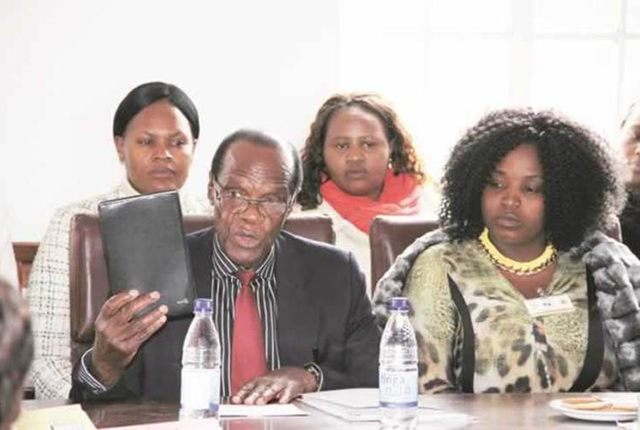Parly committees are not courts


MPs have a right to summon whoever they want to appear before them, but they should not turn oral evidence into some court cross-examination
Lloyd Gumbo Mr Speaker Sir—
The current Parliament has been lauded as one of the most vibrant in recent years because of the role played by some of the portfolio committees which have been holding members of the Executive to account without fear or favour.Some committees in general and chairpersons, in particular, have made their names because of the way they have handled oral evidence or public hearings and for that reason, they always make headlines when witnesses appear before them.
Mr Speaker Sir, journalists enjoy covering committees that are vibrant, able to articulate issues and well-researched and this is evidenced by the way they attend in droves some of the meetings that are open to the public.
Some of these committees also attract members of the public.
Yet there are also committees that one would reluctantly cover because there is no life in such meetings.
Some chairpersons and their members invite witnesses to give oral evidence, but do not prepare adequately for such meetings.
At the end of the day, those who would have put other business on hold to appear before the same committees would rue wasting their time.
Some of the committees appear as if they have the highest qualifications in praise-singing instead of holding authorities to account.
Mr Speaker Sir, portfolio committees were established so that they hold the Executive to account as part of the broader parliamentary duties.
However, there is a growing tendency that needs to be nipped in the bud before it gets out of hand.
Interrogating officials, particularly those who appear untouchable, is exciting.
But in that excitement, MPs sometimes lose focus and end up pursuing individual glory at the expense of issues at hand.
MPs must never lose focus.
Some committees in general and chairpersons in particular think that when a witness gives evidence before them, they should be put in a corner.
They enjoy “interrogating” or “grilling” witnesses even on petty issues.
Some of these committees seem to forget their terms of reference as their actions present them as public courts, where witnesses must be “interrogated” until they have nothing more to say.
Mr Speaker Sir, some officials who appear before these committees, while they should be treated as witnesses, in practise they are treated as the accused who cannot bring their legal counsel to these committees, which is provided for in natural justice.
There is no doubt that Parliament or any of its branches have the power to summon any official except the President to appear before it.
They even have the power to press contempt charges against anyone who disregards such summons, which begs the question whether they are there to deliver natural justice or to victimise witnesses.
Parliament must guard against a situation where some of its committees are abused to settle personal scores or to blackmail some people with the intention of getting something in return.
The mandate of the Legislature is to scrutinise and hold Government and its institutions to account, but not present itself as a court of law.
For instance, some committees demand a “yes” or “no” answer from witnesses and deny them an opportunity to justify their answer.
It would seem some of these actions are just grandstanding for media attention and not for addressing problems if there are any.
Yes, MPs have a right to summon whoever they want to appear before them, but they should not turn oral evidence into some court cross-examination.
Mr Speaker Sir, when committees summon a witness, their terms of reference is to seek information and not to embarrass them.
Seeking to embarrass is the reason some officials are reluctant to appear before some committees.
Legislators must stick to the rules when it comes to presentation of oral evidence. They should let facts speak for themselves than pre-occupying themselves with embarrassing witnesses.
Parliament must protect its credibility. The other major problem that has been going on for some time is some chairpersons have the tendency of wanting to dominate deliberations during oral evidence.
They talk for about three to five minutes, claiming to be seeking clarification yet in the process, they are confusing the witnesses.
Some of them keep interjecting witnesses, in the process denying them an opportunity to express themselves.
Oral evidence must seek information and nothing else.
MPs must understand that they are not courts of law. They are not there to cross-examine witnesses but to seek information.
As people’s representatives, MPs must only pursue natural justice for all citizens.
Portfolio and thematic committees must not stride away from what the Parliamentary Reform Committee through its foundation report sought to achieve.
The establishment of portfolio committees in the late 1990s was a way of delegating parliamentary functions given that parliament as a whole could not effectively carry out oversight over the executive.
The terms of reference for parliamentary and thematic committees as provided for on Parliamentary Standing Order 159 indicate that portfolio committees shall among other things:
“Monitor, investigate, enquire into and make recommendations relating to any aspect of the legislative programme, budget, policy or any other matter it may consider relevant to the Government department falling within the category of affairs assigned to it, and may for that purpose consult and liaise with such department.”
The world-over, parliamentary portfolio committees can play a major role in the legislative process as long as they stay clear of abuse from those running them.
It is therefore important that Parliament continues to have capacity building workshops with its members to conscientise them about how to conduct themselves when they summon witnesses before them.
Feedback: [email protected]








Comments